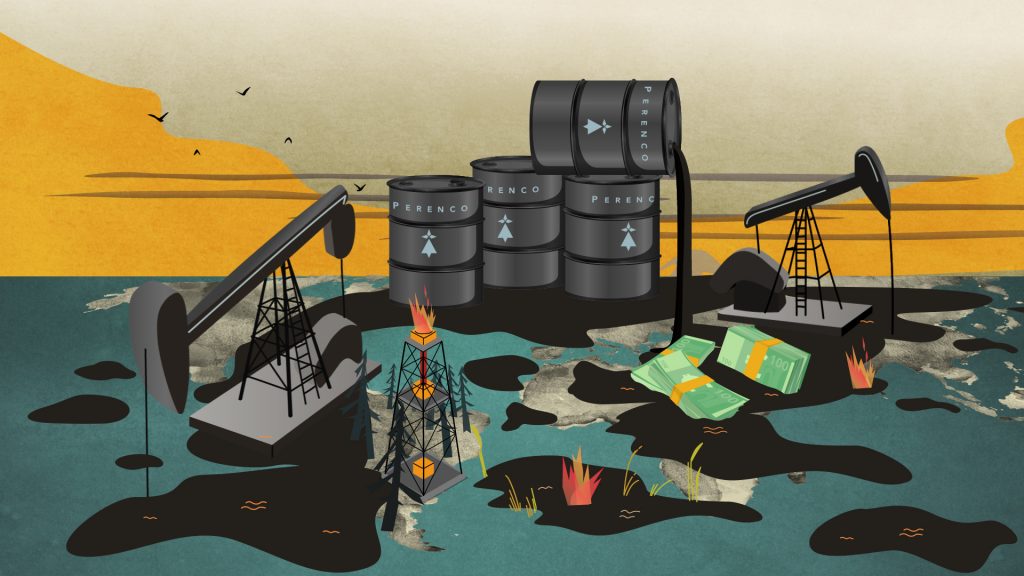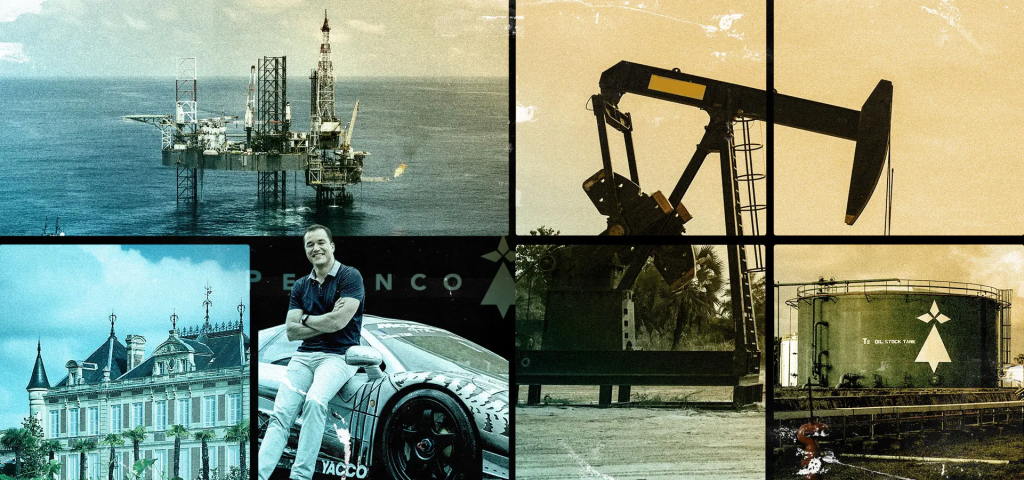By Christian Elia
When a confidential source handed Leïla Miñano some juicy information about Perenco, a private Franco-British oil and gas giant, her first response was: Perenco who? Like many people, she’d never heard of the firm.
“We had read a lot about Total or BP, but no investigative journalist had delved into this huge company,” said Miñano, a Paris-based journalist who works for Investigate Europe, a non-profit organisation that specialises in cross-border watchdog reporting.
She was recalling the genesis of Perenco Files, an IJ4EU-supported investigation into the “toxic world” of a family-owned company that styles itself as “Europe’s leading independent oil and gas group” yet whose operations in 14 countries take place far from public scrutiny.
Along with the largest onshore European oil farm, in the United Kingdom, and several gas rigs in the North Sea, Perenco has a global footprint that includes alleged pollution, structures in tax havens and political ties, the investigation found.
Miñano worked with a group of journalists, but in particular with Maxence Peigné, a London-based member of the Investigate Europe team who coordinated the extensive investigative work with her.
Miñano and Peigné recounted the backstory to Perenco Files in an interview with the International Press Institute, which leads the consortium running the IJ4EU fund.
“We realised that nobody had really done this work before because Perenco is a difficult group to investigate: they’re not listed on the stock market, so they’re subjected to very little transparency, and they seem to like it that way,” Peigné said.
“Most of their top holdings are in the Bahamas, so their corporate accounts are inaccessible. The French family behind the group, the Perrodos, had always been out of the limelight, living a wealthy but discreet life in West London. We thought it was about time journalists investigated Perenco, like they do with every other big oil firm.”
See Accused of pollution and shrouded in secrecy: why oil company Perenco is worth investigating

‘Conflicts of interest’
Investigative journalists know that tip offs from confidential sources can lead to blind alleys and cul de sacs. In this case, the source’s information propelled the reporters on their journey of discovery.
“Suprisingly our best ‘scoop’ did not came from her/him,” Miñano said. “We found it along the way, but the stories he/she told us were already a very good starting point.”
Once they were up and running, the surprises came thick and fast.
“To be honest, we did not expect to find these hidden interests of the French minister of energy transition, Agnès Pannier-Runacher, with Perenco,” Miñano said.
The investigation showed that Pannier-Runacher, whose father is a long-serving Perenco executive, was at the heart of an inheritance scheme linked to hedge funds based in tax havens that would benefit her children to the tune of €1.2 million.
Campaigners blasted Pannier-Runacher for failing to declare her involvement in the scheme as a “conflict of interest”.
Jean-Michel Runacher, the minister’s father, was removed from the corporate register on the day Investigate Europe and French investigative media outlet Disclose published revelations about their potential conflict of interest.
In early 2023, the team’s reporting on Perenco’s alleged pollution in the Democratic Republic of Congo (DRC) was quoted in the first ever lawsuit against the firm in France.
And in the spring of 2023, French authorities raided Perenco’s headquarters as part of preliminary investigations into alleged “corruption of foreign public officials, in particular in African countries”, following revelations from the team about secret share deals linked to Perenco and Congo-Brazzaville’s ruling family.
“We expected pollution and found plenty of that in DRC and Gabon,” Peigné said. “What we knew we were going to struggle to demonstrate were the whispers we had heard about the company’s proximity with African leaders.
“It took time, but with the right sources and the documents, we managed to prove that the presidential family of Congo-Brazzaville, the Sassou Nguessos, had secret shares in a Perenco oilfield, and that the group had close business ties with the inner circles of ex-DRC president Joseph Kabila.
“I was also surprised by the extent to which the Perrodos invested their oil money all around Europe through tax havens. We found the usual fancy properties in London, but also stakes in halal food, wineries, tech companies, media.”

More to reveal?
The investigation required untangling a vast web of financial and political connections and sifting through all manner of documents and reports.
“We first gathered the little body of existing articles and research on the company, then identified potential new stories,” Peigné said. “We quickly figured out we had to look toward Congo-Brazzaville for government ties and to DRC and Gabon for pollution.
“Then we reached out to sources on the ground and researched every database we could. Whenever we thought we had enough solid information for a story, we went deeper and ran with it. We took the whole investigation country by country, story by story, while of course keeping an eye on the next lead.”
For the journalists, it was important that the human impact of the story not get lost in the maze of economic and political interests.
“The stories of the huge pollution in DRC that we documented really moved me,” Miñano said. “They are destroying the forest and people’s living environnement, without any consequences. At least reporters can expose it.”
Peigné added: “In my opinion, our findings in Congo-Brazzaville were the most striking. We essentially found out that Perenco was operating an oil field with companies co-owned by government allies and the presidential family.
“Thanks to sources close to the story, we managed to get a treasure trove of emails, contracts and confidential documents giving us a chilling insight into the role secretly played by Denis Sassou Nguesso’s family in granting the drilling licence in exchange for secret shares.
“In the end, we were able to show that his daughter, Julienne Sassou Nguesso, secretly obtained 15 percent in a subsidiary of Petronor, an Oslo-listed company with a minority stake in the field.”
The success of the investigation didn’t come without stress.
“Two or three weeks after we started, we received an email from Perenco PR saying that they knew that we were investigating them and that they were ‘ready to answer our questions,’” Miñano said.
For Peigné, “the hardest was always what we suspected but couldn’t prove. We had many other leads on other stories in various countries that we may never be able to publish and which could never come to light. By the very nature of these stories, we of course can’t give any detail without solid evidence. Perhaps other journalists will be able to reveal more in the future”.
‘Great impact’
Yet looking back, the team is satisfied with the investigation’s findings.
“There were three aspects we wanted to investigate when we started to sniff around Perenco and the Perrodo family: accusations of pollution in the countries they operate in, their use of tax havens to hide and reinvest oil profits, and their close ties with kleptocratic governments,” Peigné said. “We managed to prove all of these.”
He continued: “Several of our stories had a great impact. In the wake of our findings about pollution in DRC, NGOs sued Perenco for environmental damage before French courts. After we shone light on the French minister’s conflict of interests, she had to recuse herself from any Perenco dossiers.
“Our revelations on the secret interests of the Sassou Nguessos in a Perenco oil field will certainly feed into a police investigation underway in Norway, where Perenco’s minority partner in the licence is from. We also learnt after our publication that Perenco was also under investigation in France for corruption suspicions in Africa, in undisclosed countries.
“We’ve had to move on to other stories too, but we still have a few leads on the back burner and are hoping other journalists will start digging into the company as well. There could also be more revelations emerging from police investigation in the long run, with the investigations and court cases underway in France”.
For more on this IJ4EU-supported investigation, see Perenco Files.
